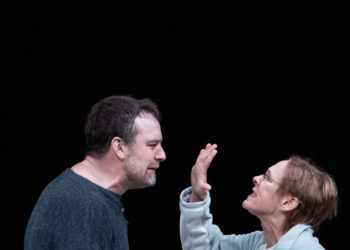In Black Mirror, creator Charlie Brooker’s ever-engrossing science-fiction anthology, technology is the phantom limb of humanity. Always a vestige, hanging around, even when we can’t see it or don’t quite understand it, the tech tends to imprint on us new versions of our same old fears. This doesn’t mean Black Mirror is always scary, though it often is. In fact, throughout seven seasons of the series, Brooker and his writing partners have delighted in imagining near futures or reality-adjacent scenarios that eagerly mix and mess with horror, humor, pathos, and poignancy – sometimes all at once. The constant is always tech, running diagnostics under the surface of timeless human emotions.
Season 7 of the series features the usual bevy of famous faces – Rashida Jones, Issa Rae, Emma Corrin, Paul Giamatti, Peter Capaldi, Cristin Milioti. And it takes us to new tech-y places, with a particular interest in artificial intelligence programs that can help or harm, depending on the input. With AI in real life throwing more and more of its digital weight around, does this make Black Mirror hit too close to home? Probably. But it feels like we asked for it.
So how does the new season of Black Mirror shape up? Are you planning a Black Mirror Season 7 marathon? Make sure to connect your wearable tech device to power – it will know if you don’t – and follow the Thronglets’ digital birdsong to our picks for the eps of Black Mirror season 7, ranked from worst to best.
-
“Plaything” (Season 7 Episode 4)
Photo: Netflix Thronglets! They’re just fun little digital guys, singing a wordless song in their 32-bit 1990s computer environment! But this is Black Mirror, so the Thronglets aren’t just that. Not at all. As told by Colin Ritman, Will Poulter’s world famous programmer, the Thronglets are “the first lifeforms in history whose biology is entirely digital.” And when they are introduced to gamer Cameron Walker (Peter Capaldi in 2034; Lewis Gribben in 1994), they quickly learn everything there is to know about humanity, including how to counteract the “savagery of the human operating system” – you gotta imagine a longhaired Capaldi letting this phrase seethe between his teeth – and how to convert the computing power of a future society into more Thronglet viability. There is a cost to that, of course, and not just in the extension cord budget. This ep of Black Mirror confronts human destruction at a mass level. But it also suggests, like the series so often does, that the outcome was an inevitability. We designed it into our systems.
-
“Bête Noire” (Season 7 Episode 2)
Photo: Netflix Be honest: would you become empress of the universe if it was a simple clickable option? In “Bête Noire,” Siena Kelly is Maria, a snackfood designer, whose work life is upended with the arrival of Verity (Rosy McEwan), someone Maria and her friends bullied in high school. Back then, Verity was “brain box clever, to the point of being off” – fast-forward to now, and Verity’s mere presence seems to unnerve Maria. But being annoyed by someone shouldn’t change the entire fabric of your reality, should it? Maybe not in real life – our technology isn’t there yet – but in Black Mirror, of course it does. In the past, Maria helped make Verity’s everyday reality hell. So the Verity of now, with the aid of a pendant powered by quantum tech, sets out to adjust the reality of Maria and all those who wronged her. Instantly, with just a click, she can make words themselves obsolete; Maria freaks out when nobody at her job understands her saying “nut allergy.” And once she fixates on Verity and learns her secret, causing a violent standoff, “Bête Noire” asks whether the power to insta-shift what’s real is too much power for any one person to have. In this story, revenge is powered by tech. But the feeling is still generated from plain old human failings.
-
“USS Callister: Into Infinity” (Season 7 Episode 6)
Photo: Netflix From Streamberry to AI insects, Black Mirror loves an in-series reference. But it never did a sequel episode until “USS Callister: Into Infinity.” The original, of course, opened Season 4, and featured Jesse Plemons as a game creator who trapped his coworkers as clones inside a torture chamber takeoff of the Star Trek bridge. Plemons’ Robert Daly died in that game and in real life, outsmarted by programmer Nanette Cole (Christin Milioti). But in “Into Infinity,” Nanette and her crew are still looking for a way out of the game known as Infinity. Inside tech, outside tech, consciousness, cloning, and dying in real life if you die a digital death – this is a typical bit of Black Mirror thorniness, and related in context to what Issa Rae’s Brandy Friday experiences in “Hotel Nocturne.” But with “USS Callister: Into Infinity,” it’s down to a war of wills between Nanette and a toxic representation of Robert. After all, if you clone yourself, you’re probably gonna clone your shitty inner life, too. In the “Callister” sequel, Nanette finds a way for her and her friends to survive, but tweaked by what the tech can provide.
-
“Hotel Reverie” (Season 7 Episode 3)
Photo: Netflix “I’ll be yours…for evermore.” The romance of getting lost in a silver screen classic lies at the heart of “Hotel Reverie,” where Issa Rae is Brandy Friday, an A-lister looking for her latest topline project, whose consciousness falls for Emma Corrin’s 1940s movie star in the syncing realms of computing power and the power of love. What? Just her consciousness? If that sounds a little meta, it totally is. A lot meta, actually. But Black Mirror is a lot of everything, and especially during a big meta swing like “Hotel Reverie.” Awkwafina plays Kimmie, whose Redream technology enables Brandy’s mental insertion into the existing celluloid “world” of Hotel Reverie. But with any tech comes technical difficulties, and as Kimmie’s team yells out warnings at their workstations – “We have a plot hole forming!” – the film’s Redream version becomes a damaged place. Not the seamless reboot the studio and its backer, Black Mirror’s Netflix stand-in Streamberry, expected, but a private place where Brandy and Dorothy Chambers (Corrin) can explore their burgeoning love. Would Brandy stay in there forever, if she could? The resolution of “Hotel Reverie” isn’t that direct, but it does pull a nice meta-inside-meta trick: AI Brandy can interact with, via an old-timey Western Electric upright telephone.
-
“Eulogy” (Season 7 Episode 5)
Photo: Netflix “Eulogy” powerfully explores the emotions that live inside and alongside our memories. What analog tech like a photograph used to offer the ability to unlock, Eulogy, an “immersive memorial” provider, will digitally drench the user within. And pretty soon, Phillip (Paul Giamatti) is apologizing to an AI-generated manifestation of the daughter of his late great lost love. To watch an actor of Giamatti’s ability get emotionally devastated is a big selling point of “Eulogy,” as “The Guide” (Patsy Ferran) draws out Phillip’s recollections of his relationship with Carol from the place where his brain buried them. But there are hallmarks here, too, of what a Black Mirror episode loves to include. Like a thought-reading, memory-viewing, all-seeing device applied to the user’s temple, much like the tactile-touch pendant in “Bête Noire,” the one connected to a quantum computer that instantly adjusts reality. In “Eulogy,” the AI helps Phillip understand that in his own reality – which was always most relevant inside his head – he’s been apologizing to Carol for over 30 years. We shed more than one tear! But we also love how this episode combines something future-fied like The Guide with shout-outs to the supposed dustbin of tech history – disposable cameras and cassette tapes, still valuable as holders of emotions and memory.
-
“Common People” (Season 7 Episode 1)
Photo: Netflix We just can’t shake the sense of dread that “Common People” gives us. Cut that with a healthy dose of heartbreak, and it might be because this episode feels so close to possible. All Amanda (Rashida Jones) and Mark (Chris O’Dowd) want to do is enjoy married life, and afford to be comfortable enough that anniversary trips to the chalet-style resort where they honeymooned don’t break the bank. They are the common people of the episode’s title. Until “common” is repurposed as a brand sector by Rivermind, an aggressive and mysterious healthcare startup, and Amanda and Mark’s medical emergency – her diagnosis of a fatal tumor – becomes the carrot on the Rivermind tech’s stick. The company, and the “neurological revolution” described by a scarily funny Tracee Ellis Ross, is to make people healthy again while transforming their brains into collective processors for its monetized services. And as Amanda becomes a human squawkbox for targeted ads – “Ride smooth with Thirst Trap Lube!” – Mark scrambles to make enough money to afford Rivermind’s tiers of gotcha upgrades. Which is where “Common People” introduces Dum Dummies, a website for the desperate to earn dollars by demeaning themselves. This ep, especially in its final moments, represents Black Mirror at its most grim. So it’s probably a commentary on our society that it also made us feel the most seen.
Black Mirror Season 7 is now streaming on Netflix.
The post ‘Black Mirror’ Season 7 Episodes: The Definitive Order That You Should Watch “Hotel Reverie,” “Common People” and More appeared first on Decider.




